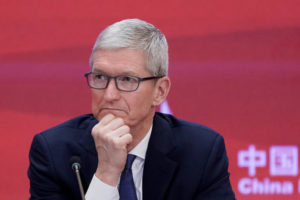By Steve Lohr
Dozens of American business leaders are challenging the Trump administration over changes to immigration policy that they say threaten the livelihoods of thousands of their skilled foreign workers, and the nation’s economic growth and competitiveness as well.
The executives, members of the Business Roundtable, expressed their “serious concern” over the administration’s immigration moves in a jointly signed letter delivered late Wednesday to Kirstjen Nielsen, the secretary of homeland security.
Some of the most prominent chief executives in the United States signed the letter, including Timothy D. Cook of Apple, Ginni Rometty of IBM, Jamie Dimon of JPMorgan Chase, Laurence Fink of BlackRock, Marc Benioff of Salesforce and Indra Nooyi, the departing head of PepsiCo.
The letter comes during a week when the broader debate over the country’s immigration policies has been reignited by the arrest of a Mexican laborer in the killing of an Iowa woman. It also underscores the continuing tension between America’s globally minded corporate establishment and the Trump administration’s “America First” agenda.
Business leaders have praised President Trump’s tax cuts and rolling back of many regulations. But they have deplored some of his statements and some of his administration’s actions, including on immigration.
In one of the most notable examples of the strain, several White House business advisory councils dissolved last year after Mr. Trump blamed “many sides” for white supremacist violence in Charlottesville, Va.
In June, a group of top executives condemned the administration for the forced separation of migrant children from their parents at the Mexican border. The Business Roundtable described the separations as “cruel and contrary to American values.”
With their letter on Wednesday, the group’s members took issue with a series of immigration enforcement guidelines that they said were “arbitrary and inconsistent” and created new and unnecessary hurdles for skilled foreigners working in the United States.
The changes, the letter stated, were “causing considerable anxiety for many thousands of our employees while threatening to disrupt company operations.”
The business group’s complaint focused on new guidelines and practices by United States Citizenship and Immigration Services, an arm of the Department of Homeland Security that vets visa applications and administers immigration policy.
The letter’s main focus was the treatment of applications for, and renewals of, H-1B visas for skilled foreign workers. The visas are used by companies to hire computer engineers and other professionals.
As a result of the changes, there has been a sharp increase in the number of denials and requests for more information. A recent analysis of government data by the National Foundation for American Policy, a nonpartisan policy research group, found that the denial rate for H-1B visa petitions had increased 41 percent in the government’s fourth fiscal quarter of 2017, compared with the third quarter.
Government examiners’ requests for additional information on H-1B visa applications tripled in the same period. The government’s fiscal fourth quarter began in July 2017, a few months after Mr. Trump issued his “Buy American and Hire American” executive order.
The policy foundation’s analysis, published last month, was meant to examine the “Trump effect” on immigration for skilled foreign workers, said Stuart Anderson, executive director of the foundation and a former immigration official.
The Trump administration, experts said, was using the government’s regulatory apparatus, which it has so often scorned, to serve its policy goal of clamping down on the flow of foreign workers into America.
“Step up investigations, slow things down, and you can accomplish your policy goals without legislation,” said Hal Salzman, a professor of public policy at Rutgers University.
In response to the business leaders’ letter, the immigration service said in a statement on Thursday that the administration had been “relentlessly pursuing necessary immigration reforms that move towards a merit-based system.” It added that it handles all applications and petitions “fairly, efficiently, and effectively on a case-by-case basis.”
The H-1B program was created to provide a pathway for talented foreigners whose special skills were expected to strengthen the American economy. Today, the nation’s technology hubs are filled with H-1B alumni who have become entrepreneurs, executives, venture capitalists and, quite often, United States citizens.
In recent years, however, the visa program has been criticized because corporations, especially Indian technology outsourcing companies, have exploited legal loopholes in the H-1B regime to replace American workers and shift jobs out of the United States. The immigration service has said its increased scrutiny and enforcement actions were intended to strengthen “protections to combat H-1B abuses.”
But to the business leaders, the policies are vague and capricious, creating uncertainty for their workers and in company operations. For example, the group’s letter stated, “companies now do not know whether a work visa petition that was approved last month will be approved when the company submits the identical application to extend the employee’s status.”
A particular concern, the business leaders said, was that the immigration service was expected to revoke work eligibility for spouses of H-1B visa holders. The spouses, they said, are often highly skilled workers who have built careers in America.
“Revoking their U.S. work authorization,” the letter said, “will likely cause high-skilled immigrants to take their skills to competitors outside the United States.”

